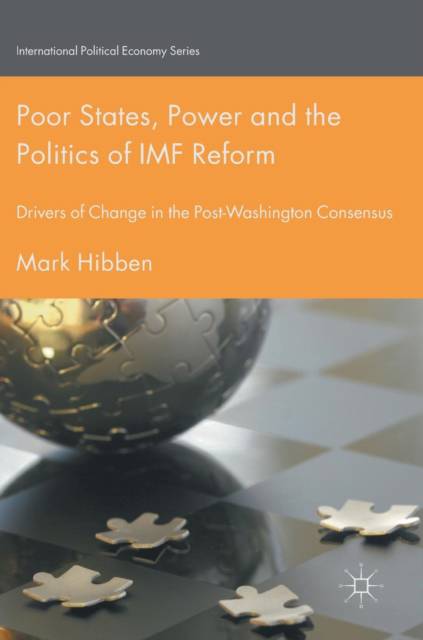
- Afhalen na 1 uur in een winkel met voorraad
- Gratis thuislevering in België vanaf € 30
- Ruim aanbod met 7 miljoen producten
- Afhalen na 1 uur in een winkel met voorraad
- Gratis thuislevering in België vanaf € 30
- Ruim aanbod met 7 miljoen producten
Zoeken
Poor States, Power and the Politics of IMF Reform
Drivers of Change in the Post- Washington Consensus
Mark Hibben
€ 167,95
+ 335 punten
Omschrijving
This books provides a timely comparative case study that reveals the factors driving the International Monetary Fund's policy reform in Low Income Developing Countries (LIDCs), as a resurgent IMF expands its footprint in the world's poorest states. Through a research design that employs both mainstream and critical IPE theory, Mark Hibben uncovers three major tendencies. Principal-agent analysis, he argues, demonstrates that coalition formation among powerful states, IMF staff and management, and other influential actors is necessary for policy reform. At the same time, he uses constructivist analysis to show that ideational frameworks of what merits appropriate macroeconomic policy response also have an impact on reform efforts, and that IMF management and staff seek legitimacy in their policy choices. In response to the crises in 1999 and 2008, the author maintains, poverty and inequality now 'matter' in IMF thinking and serve as an opportunity for policy insiders and external actors to deepen the institution's new commitment to 'inclusive' growth. Finally, Hibben draws on neo-Gramscian analysis to highlight how the IMF looked to soften the destabilizing effects of globalization through reforms focused on stakeholder participation in poor states and will continue to do so in its support of the new United Nation Sustainable Development Goals. This means that the 2015-2030 time period will be a critical juncture for IMF LIDC reform. By drawing from diverse theoretical traditions, the author thus provides a unique framework for the study of contemporary IMF change and how best those interested in LIDC policy reform can meet this objective.
Specificaties
Betrokkenen
- Auteur(s):
- Uitgeverij:
Inhoud
- Aantal bladzijden:
- 185
- Taal:
- Engels
- Reeks:
Eigenschappen
- Productcode (EAN):
- 9781137577498
- Verschijningsdatum:
- 17/06/2016
- Uitvoering:
- Hardcover
- Formaat:
- Genaaid
- Afmetingen:
- 155 mm x 220 mm
- Gewicht:
- 421 g

Alleen bij Standaard Boekhandel
+ 335 punten op je klantenkaart van Standaard Boekhandel
Beoordelingen
We publiceren alleen reviews die voldoen aan de voorwaarden voor reviews. Bekijk onze voorwaarden voor reviews.











